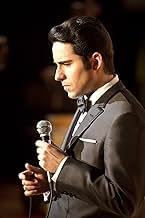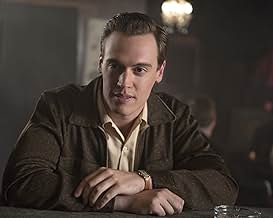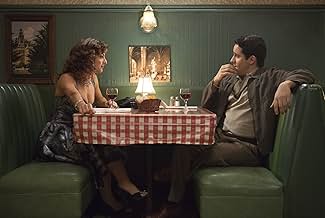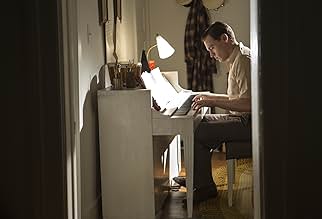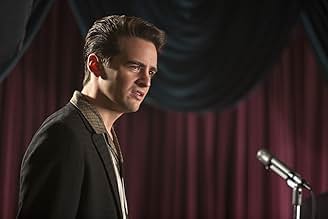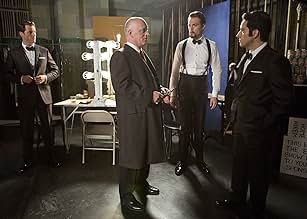The story of four young men from the wrong side of the tracks in New Jersey who came together to form the iconic 1960s rock group The Four Seasons.The story of four young men from the wrong side of the tracks in New Jersey who came together to form the iconic 1960s rock group The Four Seasons.The story of four young men from the wrong side of the tracks in New Jersey who came together to form the iconic 1960s rock group The Four Seasons.
- Awards
- 4 wins & 2 nominations
Steve Schirripa
- Vito
- (as Steven R. Schirripa)
Scott Michael Vance
- Prison Guard
- (as Scott Michael Morgan)
Storyline
Did you know
- TriviaThe actors sang live on set.
- GoofsSince the late 1800s, the Ohio State Fair is held in Columbus, not Cleveland.
- Quotes
Mary: Do you have a nickel?
Frankie Valli: Yeah.
Mary: Call your mother, you're going to be home late.
- Crazy creditsDuring the credits, the actors who were seen in the film are seen dancing to Oh What a Night (December 1963).
- ConnectionsFeatured in The Tonight Show Starring Jimmy Fallon: Clint Eastwood/Jack White (2014)
- SoundtracksDecember 1963 (Oh What a Night)
Written by Bob Gaudio (as Robert Gaudio) and Judy Parker
Featured review
"Four guys under a street lamp, when it was all still ahead of us, the first time we made that sound — our sound." Frankie Valli (John Lloyd Young)
It's next to impossible to compare director Clint Eastwood's entertaining Jersey Boys with the popular juke-box stage hit without feeling that the live production is superior. It could be using some of the stage cast, including the excellent John Lloyd Young as Frankie, highlights the electricity of physical presence over the celluloid mimicry. Or maybe because it seemed like a fuller musical on stage, with complete songs and less family squabbling. Or maybe because Christopher Walken's mobster, Gyp DeCarlo, is underplayed.
But more to the point, this film is a story of rags to riches with the speed bumps large and disorientations many despite the transcendence of the music (Sherry Baby and Walk Like a Man are only two of the memorable hits by this unusually gifted group). Eastwood spends considerable opening capital on the home life of the Jersey boys with the overdone Sopranos accent and run-ins with local cops to the exclusion of the actual development of their famous songs.
With the emergence of the Four Seasons, the musical becomes vibrant. Eastwood deftly weaves the songs into the narrative without bringing attention to just the songs. Somehow after the death of Valli's beloved but troubled daughter, My Eyes Adored You fits the distancing that fame brought to the relationship and the sadness of the loss. As Frankie moves into performances without his original group in order to pay off mob debt for his partner, Tommy DeVito (Vincent Piazza), the songs still evidence the greatness of the falsetto and the humanity of the singer.
Eastwood builds the sentiment into the narrative arc, beginning roughly in the hood and ending sweetly at the Hall of Fame, where the reunion reminds us of their unique charm even though they are old but not out of tune. Jersey Boys may not be the fullest musical imaginable with its middlin' family life sequences, but when it breaks into song with tunes accurately fitting the times, the film becomes a testimony to Clint Eastwood's ability in any genre and the glorious sound of real humans trying to balance audience, mob, and songs.
Maybe it's in the New Jersey water—someone ought to bottle it; otherwise never again will we enjoy the high-pitched romance of local boys making great music. A musical about that rarity has its challenge built into a narrative that must compete with the almost supernatural expression of music:
"After silence, that which comes nearest to expressing the inexpressible is music." Aldous Huxley
It's next to impossible to compare director Clint Eastwood's entertaining Jersey Boys with the popular juke-box stage hit without feeling that the live production is superior. It could be using some of the stage cast, including the excellent John Lloyd Young as Frankie, highlights the electricity of physical presence over the celluloid mimicry. Or maybe because it seemed like a fuller musical on stage, with complete songs and less family squabbling. Or maybe because Christopher Walken's mobster, Gyp DeCarlo, is underplayed.
But more to the point, this film is a story of rags to riches with the speed bumps large and disorientations many despite the transcendence of the music (Sherry Baby and Walk Like a Man are only two of the memorable hits by this unusually gifted group). Eastwood spends considerable opening capital on the home life of the Jersey boys with the overdone Sopranos accent and run-ins with local cops to the exclusion of the actual development of their famous songs.
With the emergence of the Four Seasons, the musical becomes vibrant. Eastwood deftly weaves the songs into the narrative without bringing attention to just the songs. Somehow after the death of Valli's beloved but troubled daughter, My Eyes Adored You fits the distancing that fame brought to the relationship and the sadness of the loss. As Frankie moves into performances without his original group in order to pay off mob debt for his partner, Tommy DeVito (Vincent Piazza), the songs still evidence the greatness of the falsetto and the humanity of the singer.
Eastwood builds the sentiment into the narrative arc, beginning roughly in the hood and ending sweetly at the Hall of Fame, where the reunion reminds us of their unique charm even though they are old but not out of tune. Jersey Boys may not be the fullest musical imaginable with its middlin' family life sequences, but when it breaks into song with tunes accurately fitting the times, the film becomes a testimony to Clint Eastwood's ability in any genre and the glorious sound of real humans trying to balance audience, mob, and songs.
Maybe it's in the New Jersey water—someone ought to bottle it; otherwise never again will we enjoy the high-pitched romance of local boys making great music. A musical about that rarity has its challenge built into a narrative that must compete with the almost supernatural expression of music:
"After silence, that which comes nearest to expressing the inexpressible is music." Aldous Huxley
- JohnDeSando
- Jun 22, 2014
- Permalink
Details
- Release date
- Country of origin
- Official sites
- Languages
- Also known as
- Những Chàng Trai Jersey
- Filming locations
- Production companies
- See more company credits at IMDbPro
Box office
- Budget
- $40,000,000 (estimated)
- Gross US & Canada
- $47,047,013
- Opening weekend US & Canada
- $13,319,371
- Jun 22, 2014
- Gross worldwide
- $67,647,013
- Runtime2 hours 14 minutes
- Color
- Sound mix
- Aspect ratio
- 2.39 : 1
Contribute to this page
Suggest an edit or add missing content














